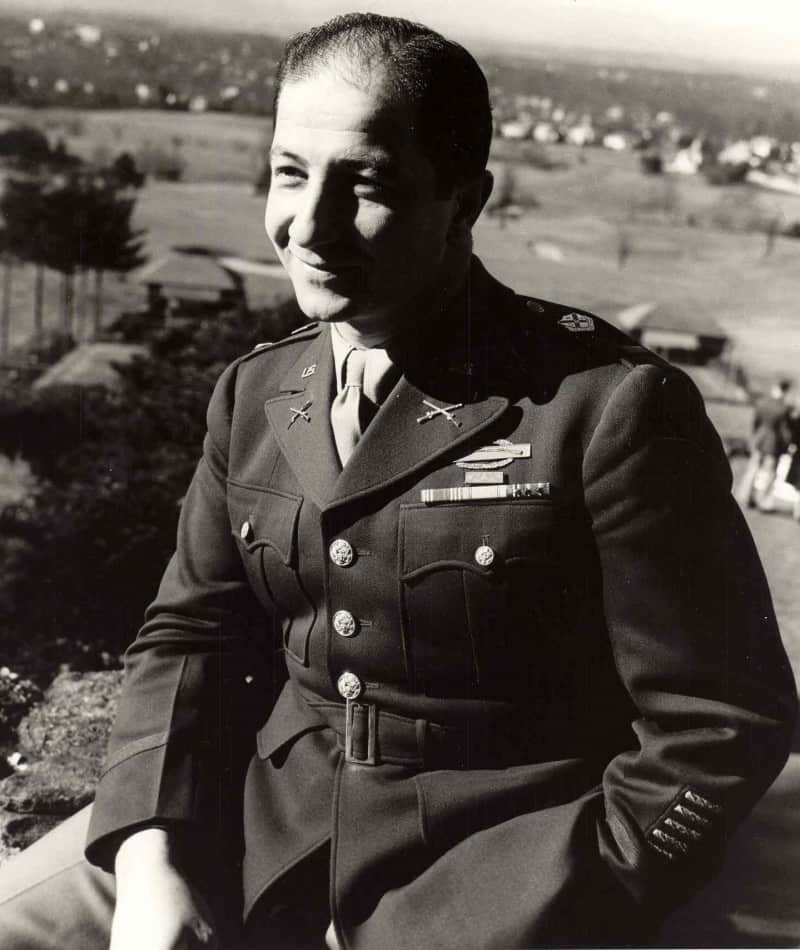Birth of Ernest Dervishian (August 10, 1916)

An incredible episode of heroism in the battle for Italy earned Ernest Dervishian the Medal of Honor, the highest military decoration of the United States, almost eighty years ago.
Dervishian was born in Richmond, Virginia, on August 10, 1916. He was the son of two Armenian immigrants who operated a candy store. He attended public schools and the University of Richmond, where he took premedical courses before deciding to study law. After passing the bar in December 1937 and receiving his degree from the university’s T. C. Williams School of Law in June 1938, he practiced law with his brother.
He enlisted in the United States Army on September 12, 1941, as a private and was assigned to the 135th Infantry Regiment, part of the 34th Infantry Division. After training in Northern Ireland, Dervishian was promoted to sergeant and sent to North Africa in late 1942, where he participated in the Tunisian campaign through May 1943. He was promoted to staff sergeant in June.
After disembarking in Italy in September 1943, the 34th Division was sent to Anzio, a coastal city where Allied troops had bogged down in January 1944 after an amphibious landing. On 23 May 1944, Dervishian, who had risen to technical sergeant, led four men on forward patrol as the Allies tried to break out of Anzio. Near the town of Cisterna, the team advanced on German dugouts near a railroad embankment. While his men covered his movement, Dervishian moved toward the enemy and captured ten soldiers. His men advanced and captured another fifteen Germans in adjacent dugouts. Noticing nine soldiers trying to flee across a ridge, the team opened fire and wounded three, while he dashed ahead and captured the remaining Germans.
The prisoners were sent to the back as four more soldiers joined the small group, which moved forward, entering a German vineyard. Just then, more German machine guns rained fire down upon them. Dervishian was slightly ahead of everyone else when the attack came. He lay still for about 10 minutes until the machine gunners paused to reload. He took advantage and reached the machine gun nest wielding a hand grenade and his rifle to capture the four-member crew. After a second enemy machine gun crew opened fire, he ordered his men to withdraw while he jumped onto the machine gun he had just captured and opened fire at the machine gun emplacement. When a third enemy nest opened fire, he began firing at them too with a captured submachine gun. Simultaneously firing with both hands in different directions, he forced five Germans in each position to surrender. Advancing alone, he captured a third machine gun nest and took six more prisoners. During the engagement, which lasted only about twenty-five minutes, Dervishian and his men captured three machine gun nests, killed many enemy soldiers, and took 54 Germans prisoner.
After participating in the liberation of Rome in June 1944, Dervishian received a battlefield promotion to second lieutenant in July. For his “conspicuous gallantry and intrepidity at risk of life above and beyond the call of duty” near Cisterna, as the citation said, he received the highest military decoration of the United States, the Medal of Honor, on 12 January 1945. He returned to Richmond, where the city honored him with a Dervishian Day on 1 February that included early closing of city government, schools and many businesses, a ceremony attended by the governor and other leaders, and a parade that drew a reported 30,000 spectators. In his speech, he remarked: “I was lucky. . . . Countless others performed acts equal to mine. They were not so lucky.” He also received tributes from the local Armenian community, the Richmond Bar Association, the city Chamber of Commerce, and the University of Richmond.
Dervishian was formally discharged in November 1945 with the rank of first lieutenant and rejoined his legal practice with his brother. In 1946–1947, he served as a national vice commander of the American Legion and from 1947 to 1959 as an assistant state attorney in Richmond. He married Anne Garoogian from New York in 1950 and they had three daughters. He served in the army reserves before retiring as a colonel in 1968. Along with such cultural figures as actor Joseph Cotten and writer Tom Wolfe, Dervishian was one of thirty-five Virginians honored by the governor in September 1972 for outstanding national achievement in their fields. He passed away on May 20, 1984, in Richmond, where he was buried on May 23, the 40th anniversary of his heroic service.
